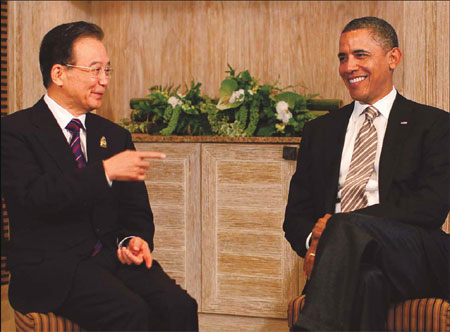Stability key to China-US ties
Updated: 2011-11-20 08:06
By Li Xiaokun and Zheng Yangpeng (China Daily)
|
|||||||||
|
|
Wen, Obama discuss yuan, military moves
BALI, Indonesia / BEIJING - Premier Wen Jiabao and US President Barack Obama vowed to keep bilateral ties stable on Saturday, amid subtle tensions between the world's two largest economies.
The two leaders made the remarks as they met briefly on the sidelines of the East Asia Summit on Saturday.
Obama's national security adviser Tom Donilon told reporters after the session that Obama stressed the importance of China adjusting its currency value, while territorial disputes in the South China Sea were briefly touched upon.
Wen's remarks, though, were chiefly economic, Donilon said.
"China has been pushing forward market-oriented reforms of the formation mechanism of the RMB value and there have been notable effects," Wen told Obama, according to a news release by the Foreign Ministry.
"There appeared depreciation expectation in the Non-Delivery Forward (NDF) foreign exchange market from the end of September to early October.
"The situation is not man-made but is the market's response to the exchanging rate of the renminbi," he said.
The Chinese government is closely watching the situation and will adjust the value of the renminbi in a stable way, he said.
Obama said the two nations should understand each other's position and strengthen ties of "strategic significance", according to the news release.
The meeting, against the backdrop of a major US foreign policy pivot to Asia, demonstrated Obama's eagerness to show US voters that he is a staunch fighter for US jobs as the next year's presidential election draws near, said Niu Xinchun, a researcher with the China Institutes of Contemporary International Relations.
The US's ailing domestic economy and high jobless rate have put creating jobs at the top of Obama's agenda. In Honolulu, Australia and the Indonesian island of Bali, Obama took every chance to talk about US job and export potential.
Obama had provoked China when meeting President Hu Jintao last week during the Asia-Pacific Economic Cooperation summit in Hawaii, saying Americans were "frustrated" and "impatient" at the pace of change in Beijing's economic policy.
Hu responded by saying a big rise in the yuan would not help the US, and that the US should not blame its trade deficit and unemployment on China.
In other signs of increased US attention to Asia during Obama's nine-day trip to the region that ended Saturday, he announced that the US will post up to 2,500 Marines in Australia from mid-2012, as a "commitment to the entire Asia Pacific region".
The move, however, drew concern from neighboring countries, with Singapore, Malaysia and Indonesia saying they were wary of new risks.
On Wednesday, US Secretary of State Hillary Clinton promised in Manila that the US will give the Philippines a second Coast Guard cutter virtually for free to help the US ally. Tension had escalated between Beijing and Manila this year on the South China Sea issue.
"We have a very complicated and quite substantial relationship with China across the board," Donilon told reporters on Saturday. He downplayed tensions between the two powers, saying they have also found vast areas of agreement.
China's Assistant Foreign Minister Liu Zhenmin also adopted a mild tone when asked about Washington's new focus on Asia, saying China is keen to cooperate with the US in the region.
Reuters said in a commentary on the same day that Obama's sharpened tone toward China was part of "a strategy that might help him counter criticism from Republican hopeful Mitt Romney, who has accused Obama of being willing to only 'whisper' to Beijing about US trade concerns".
"Historically speaking, criticizing China would not definitely win points for US president candidates. But it is a safe strategy that definitely would not lose points," Niu said.
Wen also met with the prime ministers of Australia and Singapore later on Saturday.
Australian Prime Minister Julia Gillard said before the meeting she would explain that increased US military training on Australian territory poses no threat to China. She said it was possible for Australia to have an ally in Washington and a friend in Beijing.
The Associated Press contributed to this story.
China Daily
(China Daily 11/20/2011 page1)












